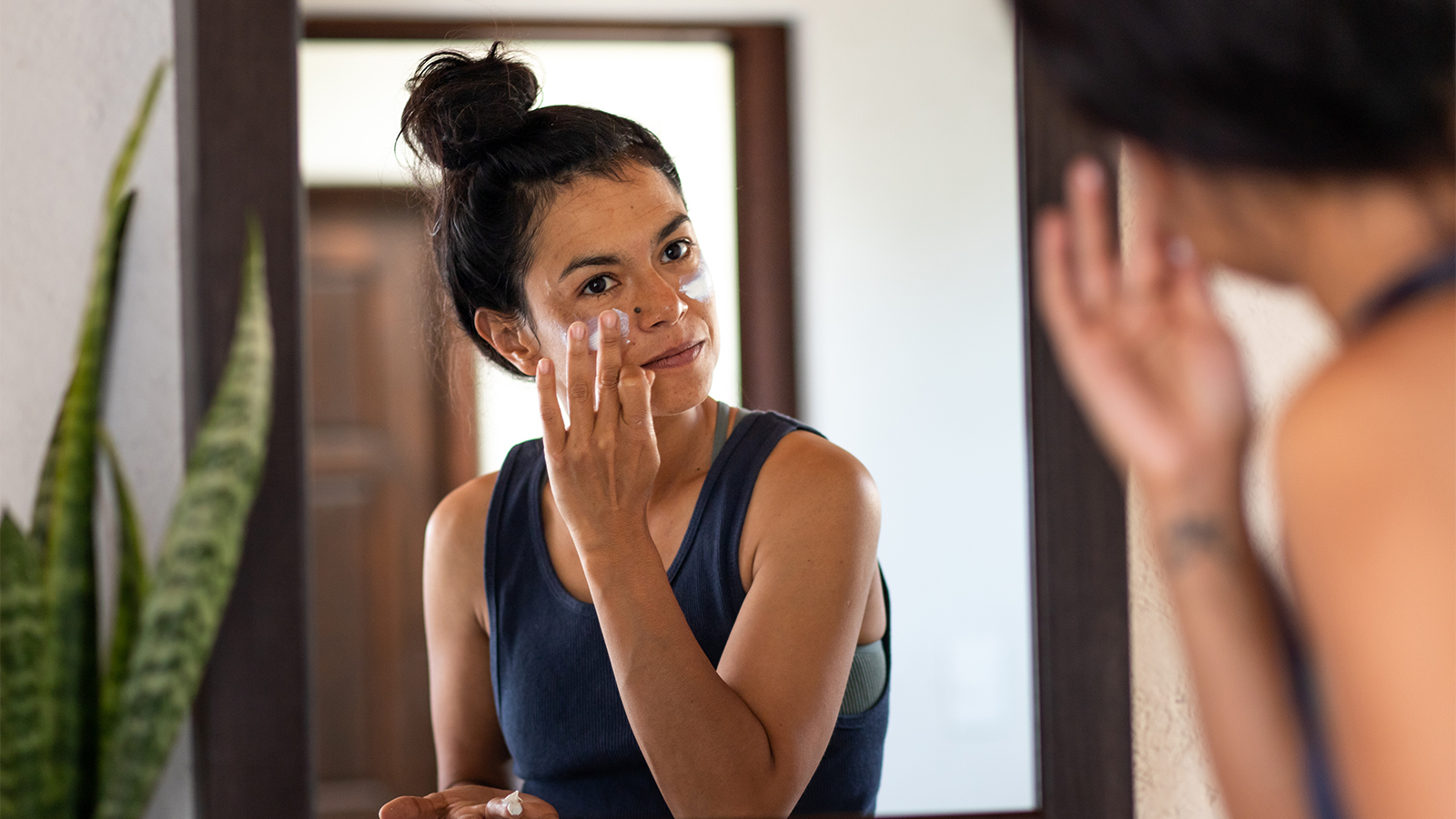10 Quick Ways to De-Stress
When stress hits, discover how to quickly reduce adrenaline levels and de-stress with these 10 effective tips.

By Dipal Willoughby, LCSW, Licensed Clinical Social Worker, Virtua Behavioral Health
You know the feeling when your stress level goes through the roof. The adrenaline rushes through your body as you try to deal with a whiny two-year-old, a tormenting teenager, the ticking watch on your wrist as you sit in traffic on the way to the doctor, or the deadline at work that seems impossible to make.
Here are 10 ways to relieve stress quickly:
- Practice breathing exercises
Focus on your breath, pushing all other thoughts aside. Be conscious of the breath coming in and going out, and focus on the sensation of inhaling and exhaling.
Or, try the square breathing technique:
- Inhale your breath as you count to 4.
- Hold your breath for 4 counts.
- Exhale your breath slowly as you count to 4.
- Hold your breath for 4 counts.
- Repeat for a few minutes until you feel calm.
- Meditate
Meditation helps quiet your mind. During meditation, you don't react to your thoughts—you notice them. To start, settle yourself into a comfortable, seated position and close your eyes. Take a few deep breaths, and then return to a steady, even breathing pattern. Focus on your breath going in and out, and return to that focus if your mind starts to wander. Even meditating for a minute can make a difference. If you want to try other forms of meditation, like guided meditation, several free apps will let you sample different meditation techniques.
- Mindfulness
Mindfulness helps you check in with yourself, practicing awareness of your thoughts, feelings, and senses in the moment without judging them. To start, do one thing mindfully each day. Pick a mundane activity like eating breakfast or brushing your teeth, and practice being present in those moments for two minutes.
- Practice gratitude
Practicing gratitude helps us appreciate the things in our lives that bring us joy. When practiced daily, gratitude helps rewire your brain to think about the positives. Each day, write down three different things you're grateful for.
- Call a support person
We are hardwired for connection, especially in times of stress. Call a friend or family member to help you unwind after a stressful day.
- Do relaxation exercises
Sometimes known as progressive muscle relaxation, practice tensing and then releasing each muscle group. If your body is physiologically relaxed, then you can't be stressed.
- Exercise
Exercise can be a great stress reliever that releases endorphins (feel-good chemicals in the brain) and helps you blow off steam. Walking or running provides rhythmic movement that can help you readjust your focus and relieve stress. When you head out for a walk or run at a stressful time, it can provide a perspective that allows you to return to your situation in a new frame of mind.
- Immerse yourself in a creative outlet
Doing something creative you enjoy, like cooking, baking, coloring with colored pencils or doodling, or taking pictures, can give you a break in a stressful situation. For example, cooking or baking requires focus, concentration, and physical activity—especially if you're making bread or rolling out dough.
- Express your feelings
Write about your stress in a journal. You can also journal about a positive experience that happened that day. This daily practice can help increase positive thinking and help to rewire your brain to think more positively.
- Be in the moment with one of your senses
Sight, smell, sound, and taste—you'll be amazed how quickly the stress melts away when you focus on just one of them. Eat something that you crave and savor each bite. Light a scented candle and breathe in your favorite scent. Listen to a beautiful piece of music and let it take you away. Look at something beautiful in your surroundings that makes you stop and stare.
You can also practice the 5,4,3,2,1 technique. Name five things you see, four things you hear, three things you touch, two things you smell, and one thing you taste. Engaging your five senses is a great way to ground yourself in the present moment and shift your focus away from stress.
If one method doesn't work for you, try another. Learning to cool down takes practice. Be patient with yourself, and you'll reap the benefits.
Get mental health support in Virtua Primary Care practices
Virtua Behavioral Health offers mental and behavioral health services in 20 Virtua Primary Care offices throughout South Jersey. To help meet patients' mental and emotional health needs, our primary care physicians refer their patients to licensed clinical social workers (LCSWs) who work within the practice. These licensed professionals provide a range of psychotherapy services, including cognitive behavioral therapy, and treat conditions including anxiety, depression, eating disorders, mood disorders, and substance abuse.
Schedule a primary care appointment online now or call 888-847-8823.
There's So Much More to Explore
Discover expert insights, inspiring stories, health tips, and more by exploring the content below!

Understanding Food Addiction: Causes, Symptoms, and Recovery Strategies

10 Hand Washing Tips to Keep You Healthy All Year

How Exercise Helps Fight the Winter Blues and Improve Your Mood

Cervical Cancer Screening Guidelines: What You Need to Know

HeartTalk Magazine

How to Spot the Early Signs and Symptoms of a Stroke

How Weight-Loss Surgery Can Improve Diabetes, Heart Health, and More

How to Achieve Your Health Goals This Year

Knee Replacement Rehab: 7 Exercises to Restore Your Strength and Range of Motion

Caregiving During the Holidays: Ways to Manage Stress and Find Joy

Do Weighted Blankets Actually Work?

Bioidentical Hormone Replacement Therapy Pellets: Relief for Menopause and Andropause Symptoms

COVID-19 Vaccines and Pregnancy: FAQs

COMFORTing Tips to Avoid Holiday Heartburn

How to Tell the Difference Between Cold, Flu, and COVID-19

Daily Wellness Checklist: Simple Habits for Feeling Good Inside and Out

3 Reasons Why Now's the Time to Find Relief From Varicose Veins

How to Get and Stay Healthy This Fall

How to Reverse Prediabetes and Prevent Type 2 Diabetes

6 Ways to Get More Out of Your Daily Walk

Social Tips for Introverts: Finding Connection While Preserving Your Energy

Is Cancer Hereditary? What You Need to Know About Your Genetic Risks

Is Your Post-Pregnancy Belly Bulge a Sign of Diastasis Recti?

Your Guide to Mammograms: When to Get Screened and What to Know

The Top 10 Foods That Boost Your Brain Health

Is It Safe to Exercise During Pregnancy?

Prevent Yard Work Injuries: Tips for Mowing, Gardening, and Raking

Where To Seek Mental Health Help And Treatment

How to Curb Nighttime Snack Cravings

Is Your Daily Walk Making You Really Sore?

IBS and Alcohol: Can You Still Enjoy a Drink?

Focus on Mental Health Is Key Part of Andrew's Weight-Loss Journey

'Feeling Joy Again': ECT Brain Stimulation Therapy Restores Ashley's Well-Being

Easy, Healthy Lunch Ideas for the Beach

How to Stay Cool and Prevent Heat Illness All Summer Long

Do Not Get Burned by These Sunscreen Myths

Beat the Bugs and Save Your Summer

How to Have a Healthy Pregnancy if You're Overweight

Why You Get Sick on Vacation (and How to Stay Healthy While Traveling)

6 Hot Tips for a Safer Summer

4 Surprising Health Truths You Should Know

5 Interesting Facts About Your Heart

Is Low Sex Drive Normal? Revealing the Complex Causes of Low Libido in Women

5 Feel-Good Activities to Explore Around South Jersey

Stress Incontinence vs. Urge Incontinence: What's the Difference?

Tips to Support Your Childs Mental Health

3 Changes You Can Make Today to Lower Your Cancer Risk

A Lung Cancer Screening Could Save Your Life

Mood Swings vs. Mood Disorders: Know the Signs and Get Help
Are emotional ups and downs disrupting daily life? Learn common signs of mood disorders, and when to talk to a doctor about diagnosis and treatment options.

Take Pride in our Health: Must Dos for LGBTQ+ Preventative Care

Protect Yourself From Tick Bites and Lyme Disease

10 Quick Ways to De-Stress

4 Ways to Stay Fit and Healthy on a Budget

From Restless to Restful: How Movement Improves Sleep

5 Simple Ways to Spring Clean Your Wellness Routine

Best Foods for Kidney Health

5 Essential Winter Foot Care Tips When You Have Diabetes

Your 10-Point Plan to Avoid Winter Weight Gain

Surprising Symptoms May Signal Stroke In Women

8 Key Steps to Better Blood Pressure Control

5 Back Stretches for the Work-From-Home Workweek

The HPV Vaccine: A Powerful Shield Against Cervical Cancer

How to Prevent and Treat Urinary Tract Infections

6 Numbers Key to Keeping Your Heart Healthy

4 Easy Ways to Treat and Prevent Runner's Knee

Five Mindfulness Tips That Can Help Heal Your Heart
Working from Home? Take a Quick Break to Stretch Your Wrists

Love Your Heart: Essential Care Tips for Every Stage of Life

How Do I Measure My Blood Pressure at Home?

How Do I Improve My Cholesterol Levels?

3 Ways to Reduce Your Stroke Risk

Overcoming Addiction, Philip Now Sees More Positive Side to Life

How Sex Keeps You Healthy as You Age

Protect Your Child From HPV and Related Cancers

Why IUDs Might Be The Most Effective Birth Control

5 Things You're Too Embarrassed to Tell Your OBGYN

4 Not-So-Crazy Questions to Ask Your Doctor

